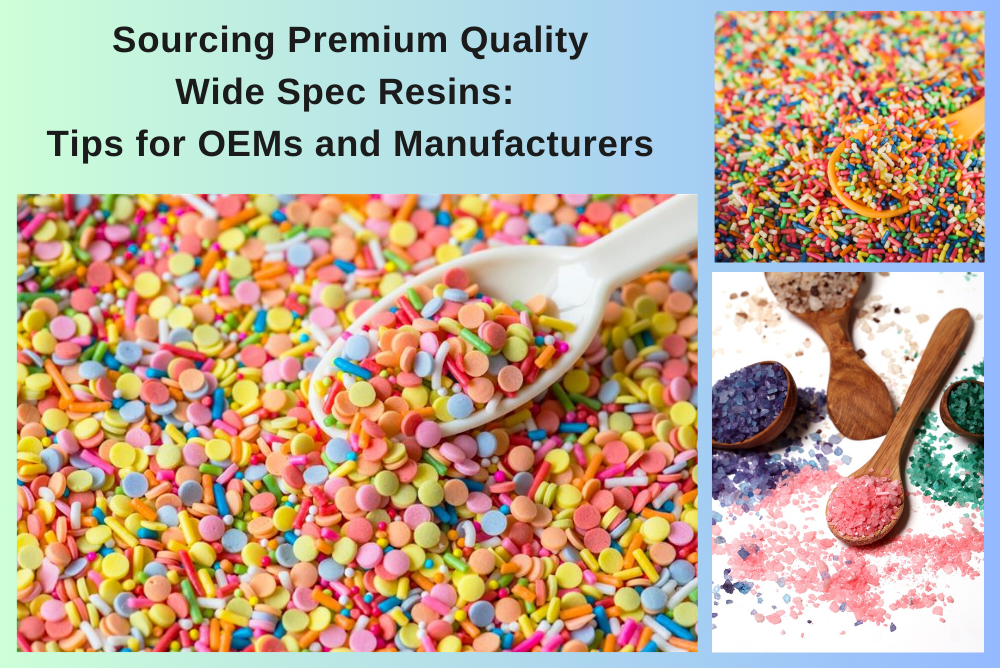Sourcing Premium Quality Wide Spec Resins: Tips for OEMs and Manufacturers
Wide spec or off-spec resins are byproducts of virgin plastic polymerization that do not meet the standard specifications required for primary plastic products. These resins are often sold to wide spec resin suppliers, compounders, and other specialized buyers. They may have altered physical or chemical properties due to factors like heat exposure or improper processing. Despite these changes, they can still be used in various applications. Many plastic resin suppliers offer them at a lower cost compared to virgin plastics, making them an attractive option for manufacturers looking to reduce expenses without compromising on quality. This article explores the types, properties, and applications of wide spec resins.

What Are Wide Spec Resins?
Also known as off-grade resins, wide spec resins fall outside the standard specifications typically required for high-quality plastic products. Depending on the nature of the deviation—such as color, density, or mechanical strength—they can be classified as either good wide spec or bad wide spec. For example, some resins may appear discolored, such as being pale or caramelized, which makes them unsuitable for certain applications. Since these resins are byproducts of the production process, they do not require additional time or cost for manufacturing, making them a cost-effective alternative.
Wide Spec Resins Types, Properties, and Applications
Although off-grade resins are not strictly defined, their properties usually differ slightly from standard ones depending on the type. Common examples include ABS, acrylic, polycarbonate, polypropylene, and polyurethane. Here's a closer look at some of these materials and how they might be considered wide spec:
- ABS
- Standard properties: Acrylonitrile Butadiene Styrene (ABS) is an amorphous thermoplastic known for its high impact resistance, durability, and ease of processing. It is commonly used in automotive parts, electronics, and consumer goods.
- Wide Spec: Variations in color, density, or mechanical properties can classify ABS as wide spec. This often happens when it’s blended with other materials incorrectly or exposed to excessive heat during processing.
- Applications: ABS is widely used in computer peripherals, vehicle interiors, toy manufacturing, and electrical enclosures.
- Acrylic
- Standard properties: Acrylic is valued for its transparency, lightweight nature, and impact resistance. It is often used as a glass substitute in applications like signage, windows, and displays.
- Wide Spec: Wide spec acrylic may show reduced clarity, altered tensile strength, or inconsistent density, which limits its use in optical applications.
- Applications: It is used in partitions, lenses, furniture, and electronic displays. However, opaque or discolored acrylic may not be suitable for transparent uses.
- Polycarbonate
- Standard properties: Polycarbonate (PC) is known for its strength, transparency, and UV resistance. It is commonly used in safety glasses, automotive parts, and medical devices.
- Wide Spec: If the polymerization process deviates from standard formulations, PC may exhibit differences in transparency, density, or mechanical strength.
- Applications: Wide spec PC is often used in food containers, kitchenware, and general-purpose packaging.
- Polypropylene
- Standard properties: Polypropylene (PP) is a versatile material with low density and good heat resistance. It can be manufactured in different forms, from rigid to flexible, and is commonly used in packaging and consumer goods.
- Wide Spec: Changes in molecular structure during polymerization can lead to variations in hardness or heat resistance, making it wide spec.
- Applications: PP is used in films, bottles, and industrial components across various sectors.
- Polyurethane
- Standard properties: Polyurethane (PU) is known for its flexibility, durability, and ability to withstand abrasion. It is often used in seals, gaskets, and cushioning materials.
- Wide Spec: Variations in the molecular structure can result in deviations from standard properties, such as reduced elasticity or load-bearing capacity.
- Applications: PU is used in automotive parts, sporting equipment, and industrial components.
How to Choose the Right Wide Spec Resin?
Selecting the right wide spec resin depends largely on your specific application needs. Here are some key considerations:
- Understand your project requirements and operating conditions. Compare them with the properties of available resins.
- Consider using wide spec resins if they meet your needs, or explore customization options. They are generally more cost-effective than standard resins.
- Check for critical properties like density, melting point, temperature resistance, and mechanical strength.
- Ensure the material is safe and free from harmful emissions, especially for sensitive applications.
- Be aware of any color changes and confirm they are acceptable for your use case.
- Consider the surface finish and texture you need, and verify that the material meets those standards.
- If your application involves food, healthcare, or other regulated industries, ensure the resin meets relevant certifications like FDA, RoHS, REACH, or NSF.
If you're an OEM producing large volumes of plastic parts, you may need specific types of wide spec resins. It’s important to source high-quality materials from reliable suppliers who can meet your unique requirements. Mid Continent Plastics is a leading supplier of wide spec resins, offering a wide range of options for various industries. With over 30 years of experience, they provide premium quality materials tailored to your needs. Whether you’re looking for small or large quantities, they can help you find the right solution.

Punch Press Machine,Tin Can Making Machine,End Caps Making Machine,Basic Shell Cover Making Machine
Zhoushan Golden Wing Machinery Co., Ltd. , https://www.goldenwingmachines.com